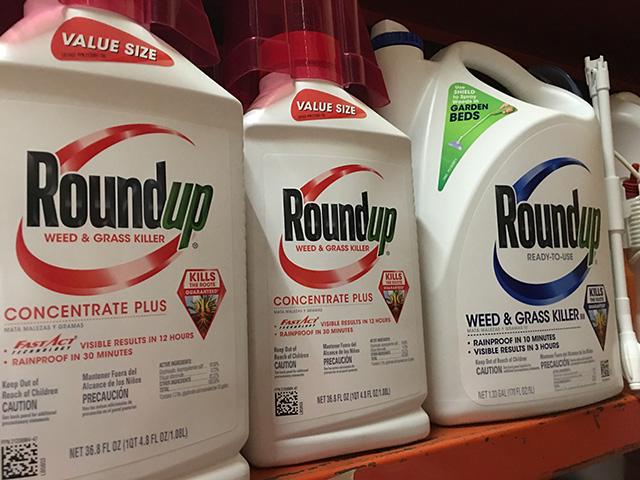Court Rejects EPA Glyphosate Analysis
Ninth Circuit Court of Appeals Orders EPA to Re-examine Cancer Risks of Glyphosate
OMAHA (DTN) -- As if the civil litigation and EPA decisions on glyphosate weren't complicated enough, the Ninth Circuit Court of Appeals on Friday rejected EPA's analysis for determining that glyphosate is likely not carcinogenic to people and ordered EPA to conduct "further analysis and explanation."
The ruling, if left standing, will force EPA to re-examine the registration of glyphosate under the Federal Insecticide, Fungicide and Rodenticide Act (FIFRA) when it comes to whether there is link between glyphosate and cancer.
The ruling came in a pair of cases filed by environmental and farm labor groups against EPA. Several major agricultural groups fighting to keep glyphosate's registration and usage legal also had intervened in the case.
The Center for Food Safety, one of the litigants in the case, praised Friday's court ruling.
"Today is a monumental victory for farmworkers, wildlife, and the public," said Amy van Saun, a senior attorney at CFS and lead counsel in the case. "The court has held EPA's approval of Monsanto's glyphosate unlawful and rebuked EPA for ignoring real-world evidence of cancer risks from using glyphosate, and for failing to even consider impacts to endangered species,"
Bayer AG, in a statement to DTN, cited multiple risk assessments of glyphosate and statements from EPA on the herbicide. Most recently, EPA sent a letter to California regulators in April that the agency "continues to stand behind its robust scientific evaluation and its conclusions regarding glyphosate's non-carcinogenicity remains consistent with many international expert panels and regulatory authorities." EPA's 2020 interim registration also found no association between glyphosate-based herbicides and non-Hodgkin's lymphoma, Bayer noted.
P[L1] D[0x0] M[300x250] OOP[F] ADUNIT[] T[]
Bayer stated: "We believe that the U.S. EPA will continue to conclude, as it and other regulators have consistently concluded for more than four decades, that glyphosate-based herbicides can be used safely and are not carcinogenic, and we are committed to working with the Agency to minimize the environmental impacts of our products. Importantly, the current product registrations remain in place and growers and other users can continue to use the products based on the current label instructions."
In the 54-page ruling on Friday, a three-judge panel in the Ninth Circuit Court of Appeals sided with the Rural Coalition, a pair of farmworker groups from California and Florida, the Center for Food Safety and Beyond Pesticides that had challenged EPA's 2020 registration decision that glyphosate "poses no risks to human health." The Appeals Court ruled EPA's decision "was not supported by substantial evidence." The panel of judges then ordered to vacate EPA's determination on human health and remanded it back to EPA for more analysis.
While Friday's Ninth Circuit ruling stated there is "substantial evidence" that glyphosate could be carcinogenic, the European Chemicals Agency published a risk assessment on May 30 that "based on a wide-ranging review of scientific evidence, the committee again concludes that classifying glyphosate as a carcinogen is not justified." (https://echa.europa.eu/…)
The Ninth Circuit also ruled EPA "shirked its duties" and did not adequately examine whether glyphosate poses risks under the Endangered Species Act. EPA didn't consult with the U.S. Fish and Wildlife Service or the National Marine Fisheries Service in EPA's last registration decision on glyphosate as well. The ruling noted, "It is undisputed that EPA failed to do so." Still, the court declined to vacate that part of EPA's registration on glyphosate because of timelines posed by Congress.
Under a 2007 law, EPA must review pesticide registrations every 15 years. Reflecting the complication of these reviews, EPA started its registration review of glyphosate in 2009. Court battles have mounted since EPA released a preliminary risk assessment on glyphosate in 2015. That was about the time thousands of people also began suing Monsanto (now Bayer AG), tying glyphosate exposure to non-Hodgkin's lymphoma.
Friday's ruling is just the latest in a series of decisions and court battles tied to glyphosate.
As DTN has reported, Bayer AG is waiting to see if the Supreme Court will take up its appeal of a 2019 California jury award of $25 million to Edwin Hardeman over his non-Hodgkin's lymphoma. A key part of that case is tied to a California law requiring glyphosate products such as Roundup to be labeled as a "chemical known to the state to cause cancer." Bayer AG and agricultural groups maintain FIFRA supersedes state law. Read more here: https://www.dtnpf.com/….
More than 50 agricultural groups and U.S. senators also have criticized the Biden administration's solicitor general for issuing an opinion backing California's labeling law and recommending the Supreme Court not take up Bayer AG's petition. (https://www.dtnpf.com/…)
House Republicans introduced a bill this past week that includes language declaring that glyphosate is not carcinogenic and would block states from requiring such labels.
To read the Ninth Circuit's full ruling, see https://www.centerforfoodsafety.org/….
Chris Clayton can be reached at Chris.Clayton@dtn.com
Follow him on Twitter @ChrisClaytonDTN
(c) Copyright 2022 DTN, LLC. All rights reserved.






